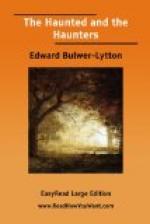“And it is through the material agency of that human brain that these things would acquire even a human power—would strike as with the shock of electricity, and might kill, if the thought of the person assailed did not rise superior to the dignity of the original assailer—might kill the most powerful animal if unnerved by fear, but not injure the feeblest man, if, while his flesh crept, his mind stood out fearless. Thus, when in old stories we read of a magician rent to pieces by the fiends he had evoked—or still more, in Eastern legends, that one magician succeeds by arts in destroying another—there may be so far truth, that a material being has clothed, from its own evil propensities certain elements and fluids, usually quiescent or harmless, with awful shape and terrific force—just as the lightning that had lain hidden and innocent in the cloud becomes by natural law suddenly visible, takes a distinct shape to the eye, and can strike destruction on the object to which it is attracted.”
“You are not without glimpses of a very mighty secret,” said Mr Richards, composedly. “According to your view, could a mortal obtain the power you speak of, he would necessarily be a malignant and evil being.”
“If the power were exercised as I have said, most malignant and most evil—though I believe in the ancient traditions that he could not injure the good. His will could only injure those with whom it has established an affinity, or over whom it forces unresisted sway. I will now imagine an example that may be within the laws of nature, yet seem wild as the fables of a bewildered monk.
“You will remember that Albertus Magnus, after describing minutely the process by which spirits may be invoked and commanded, adds emphatically that the process will instruct and avail only to the few—that a man must be born a magician!—that is, born with a peculiar physical temperament, as a man is born a poet. Rarely are men in whose constitution lurks this occult power of the highest order of intellect;—usually in the intellect there is some twist, perversity, or disease. But, on the other hand, they must possess, to an astonishing degree, the faculty to concentrate thought on a single object—the energic faculty that we call will. Therefore, though their intellect be not sound, it is exceedingly forcible for the attainment of what it desires. I will imagine such a person, pre-eminently gifted with this constitution and its concomitant forces. I will place him in the loftier grades of society. I will suppose his desires emphatically those of the sensualist—he has, therefore, a strong love of life. He is an absolute egotist—his will is concentrated in himself—he has fierce passions—he knows no enduring, no holy affections, but he can covet eagerly what for the moment he desires—he can hate implacably what opposes itself to his objects—he can commit fearful crimes, yet feel small remorse—he resorts rather to curses upon others, than to penitence for his misdeeds. Circumstances, to which his constitution guides him, lead him to a rare knowledge of the natural secrets which may serve his egotism. He is a close observer where his passions encourage observation, he is a minute calculator, not from love of truth, but where love of self sharpens his faculties—therefore he can be a man of science.




